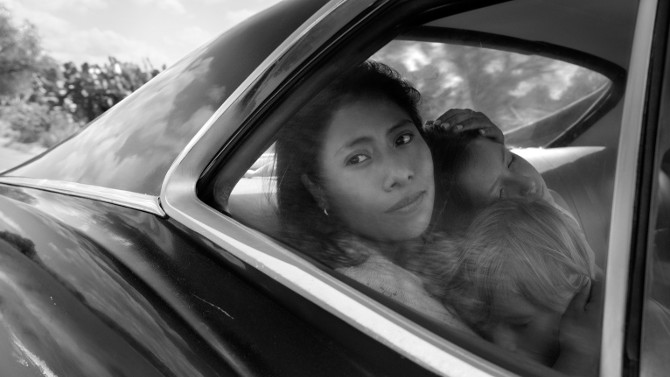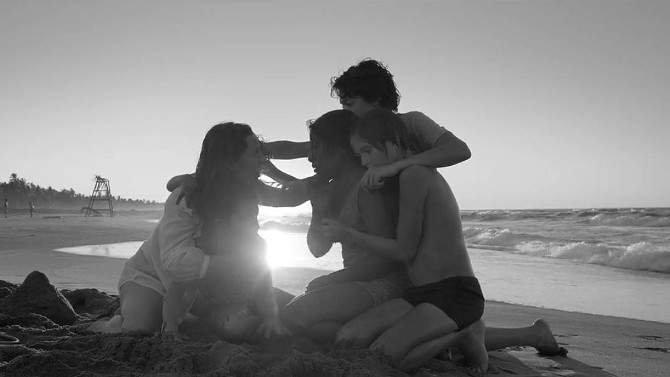Alfonso Cuarón’s most personal film to date (even more so than Y Tu Mamá También), 2018’s Roma seeps to the screen from the filmmaker’s own memories. . . a love letter to his beloved housekeeper who helped raise him in the neighbourhood of Roma in Mexico City all those years ago.
His first Netflix feature, the streaming service gave Cuarón the freedom to create his vision his way. . . with a near limitless shoot time, the man not only directed, but also wrote, produced, co-edited, handled cinematography, and even shot the motion picture. Filmed in striking black and white, it is like seeing the most picturesque of monochrome postcards, but eerily intimate ones.
Instead of taking the viewpoint of himself, one of the children in the house, Roma tells housekeeper Cleo’s (newcomer Yalitza Aparicio) tale, both an insider and outsider to the family, part of their lives and their love, yet not truly one of them. Coming from the impoverished outskirts of the city, her upbringing is nearly unfathomable to the children she helps raise – scenes where she visits her neighbourhood are jarring in their juxtaposition to the beauty and comfort of the middle class streets that are Roma.
With a gloss to every surface, light, people and items glowingly reflect like in no other film. It is a symbol of this middle class life, the beauty, the care, the safety of money. . . no such reflections are seen in the above mentioned slums. Though, not all is well in this shiny oasis, for matriarch Sofía (Marina de Tavira) is struggling in her marriage, the children’s father, Antonio (Fernando Grediaga), routinely heading out for supposed conferences in Quebec, and later, Ottawa.
Sofía’s reaction when he leaves is telling, and it is subtle moments such as these that litter this picture with majestic humanity. . . one of the children lovingly reaching his arm around Cleo as she cleans up around the family as they watch tv; Cleo rushing to catch up to the kids on the bustling night streets of Mexico as they make their way to the cinema; the gut wrenching knowledge that when Cleo reveals she is pregnant to her lover, Fermín (Jorge Antonio Guerrero), he immediately claims to have to go to the bathroom (not a good sign, he should probably be renamed Vermin) – all of this pain set in the magic of the movie theatre; upon looking for Fermín at an outdoor martial arts lesson months later, the martial arts master performs a near impossible feat, a quick flash revealing that Cleo is the rare person able to do it; and, when the family takes a trip to allow their estranged father to collect his things (including his beloved bookshelves), upon returning home, a blink-and-you’ll-miss-it line has one of the children innocently claiming that he must have really missed said bookshelves; these moments giving the intimate story a sense of poignant simplicity, yet Cuarón’s telling and craftsmanship is extremely complex (a scene in which Cleo turns off the lights consists of forty-five different camera positions, while its flat, subtle camera work only accentuates the dynamic visual background).
Though, for those of you who know Cuarón’s work, he is also a master at building from said subtle moments to a crescendo of sudden shocking violence or pain (and vice versa) – think of the car scene from Children of Men (just one of many moments like this in the film), or the immediateness of the chaos in Gravity. In this film, there are three distinct moments. . . the early 1970s were a time of social unrest in Mexico, and a quickly elevating protest while Cleo and Sofía’s mother, Teresa (Verónica García), shop for something as simple as a baby crib, is immediately evident – the chaotic violence clashing brilliantly with the gentle, day to day life of an ordinary family; the immediacy of a childbirth (better able to connect the dots to how personal Cuarón’s work actually is, it will immediately harken people back to a scene in Children of Men), the normally joyous event less so – cold enough to deliver a shiver through the screen; and a climactic moment at the beach – an unbelievable, long single take that unfurls the love, bravery, and heart of this wonderful woman. When you combine these two factors, the seeming and subtle simplicity with the complex and often jarring moments, you truly are able to realize Cuarón’s genius of film making – the whole piece a slow burner of a drama, a mesmeric, hypnotic tribute to those selfless people who help nurture us with loving devotion.
So very real (shot on location, you will notice airplanes are often in the background – they take off every five minutes in Mexico City; also, Cuarón has claimed ninety percent of the story is pulled from his own recollections – he went so far as to reassemble the original furniture from his childhood home from family members around Mexico), Roma is a stunning arthouse experience. Nominated for Best Picture (and nine other Academy Awards), it could be the first foreign language film (and the first Netflix film) to win the honour. A final note, Cuarón spent a lot of time in movie theatres as a child thanks to his housekeeper, who would frequently take him and his siblings – an example of this is John Sturges’ 1969 space picture Marooned, which plays in the film – a sly wink that this movie influenced the filmmaker in making Gravity. So, ride the wave of adulation reigning down on Roma, it is true what they say – all roads lead there.




Nik, I sought out this movie a month before the Academy Awards and viewed it with patient intensity. The reading of your very personal and sensitive review carried it all memories back to me, improved.
“With a gloss to every surface, light, people and items glowingly reflect like in no other film. It is a symbol of this middle class life, the beauty, the care, the safety of money. . .”
“when the family takes a trip to allow their estranged father to collect his things (including his beloved bookshelves), upon returning home, a blink-and-you’ll-miss-it line has one of the children innocently claiming that he must have really missed said bookshelves; these moments giving the intimate story a sense of poignant simplicity…”
You can copyright these lines (as they already are) as evidence of your nuanced perceptive abilities.
Thanks for this review, which I am sharing with others.
David
What a beautiful review Nik! I know he is one of your favourite directors and I can’t wait to see this what sounds like an incredible film!